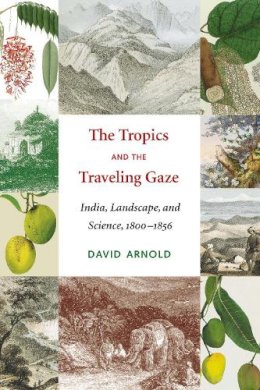
Stock image for illustration purposes only - book cover, edition or condition may vary.
The Tropics and the Traveling Gaze: India, Landscape, and Science, 1800-1856 (Culture, Place, and Nature)
David John Arnold
€ 40.76
FREE Delivery in Ireland
Description for The Tropics and the Traveling Gaze: India, Landscape, and Science, 1800-1856 (Culture, Place, and Nature)
Paperback. Considers the European representation and understanding of landscape and nature in early nineteenth-century India. This book draws on travel narratives, literary texts, and scientific literature to show the diversity of European responses to the Indian environment and the ways in which these contributed to the wider colonizing process. Num Pages: 312 pages, black & white illustrations. BIC Classification: 1FKA; 3JH; GTB; RGC; RNT. Category: (G) General (US: Trade). Dimension: 229 x 154 x 19. Weight in Grams: 490.
Offers a new interpretation of the history of colonial India and a critical contribution to the understanding of environmental history and the tropical world. Arnold considers the ways in which India’s material environment became increasingly subject to the colonial understanding of landscape and nature, and to the scientific scrutiny of itinerant naturalists.
Product Details
Format
Paperback
Publication date
2014
Publisher
University of Washington Press
Condition
New
Series
Culture, Place, and Nature
Number of Pages
312
Place of Publication
Seattle, United States
ISBN
9780295993836
SKU
V9780295993836
Shipping Time
Usually ships in 15 to 20 working days
Ref
99-22
About David John Arnold
David Arnold is professor of the history of South Asia at the School of Oriental and African Studies, University of London. He is the author of a number of books, including Colonizing the Body: State Medicine and Epidemic Disease in Nineteenth-Century India and The Problem of Nature: Environment, Culture, and European Expansion.
Reviews for The Tropics and the Traveling Gaze: India, Landscape, and Science, 1800-1856 (Culture, Place, and Nature)
"An eminently readable book, The Tropics and the Traveling Gaze unravels the mysteries of the tropics in India as constructed by nineteenth-century Europeans. . . . A richly documented and important book which will be useful to students from a range of interdisciplinary fields."
Victorian Studies
"The Tropics and the Traveling Gaze deserves a wide audience. Any historian of biology interested in British imperialism, Romanticism, scientific networks (particularly those linking metropolitan and colonial naturalists) and imperial environmental history will find it an enjoyable, informative, and intellectually stimulating read."
Journal of the History of Biology
"The Tropics and the Traveling Gaze is a valuable book for historians and anthropologists..Despite the vast literature on all the themes presented in the book, none connects these various topics as elegantly as the current volume. Arnold's writing style is graceful, his arguments are persuasive, and his creative use of non-governmental sources allow for an original approach to a history of the land."
Itinerario
"David Arnold's absorbing study will reward anyone interested in botany and biogeography, scientific travel, colonial science, and the impact of Romanticism on nineteenth-century science."
ISIS
"In The Tropics and the Traveling Gaze, David Arnold deftly untangles and analyses the nature of the connections between literary representations of the land, the development of botanical knowledge, and the consolidation of colonial power."
Times Literary Supplement
"A fascinating cast of travelers, scientists, and others populate Arnold's account…it addresses important conceptual issues and provides an entertaining account full of specific insights and fascinating characters. Anyone interested in the cultural dimensions of the constructions of power and knowledge in colonial settings will find the book worthwhile."
History
"A rich study of changing British perceptions of India… it will provide scholars of science and nature in colonial India many new insights about an overlooked period and subject. Arnold's arguments about how scientific travelers of the early nineteenth century reimagined India as a place of death and tropicality are nuanced and powerful. His contentions about the their connection to growing British power…are also important."
Environmental History
Victorian Studies
"The Tropics and the Traveling Gaze deserves a wide audience. Any historian of biology interested in British imperialism, Romanticism, scientific networks (particularly those linking metropolitan and colonial naturalists) and imperial environmental history will find it an enjoyable, informative, and intellectually stimulating read."
Journal of the History of Biology
"The Tropics and the Traveling Gaze is a valuable book for historians and anthropologists..Despite the vast literature on all the themes presented in the book, none connects these various topics as elegantly as the current volume. Arnold's writing style is graceful, his arguments are persuasive, and his creative use of non-governmental sources allow for an original approach to a history of the land."
Itinerario
"David Arnold's absorbing study will reward anyone interested in botany and biogeography, scientific travel, colonial science, and the impact of Romanticism on nineteenth-century science."
ISIS
"In The Tropics and the Traveling Gaze, David Arnold deftly untangles and analyses the nature of the connections between literary representations of the land, the development of botanical knowledge, and the consolidation of colonial power."
Times Literary Supplement
"A fascinating cast of travelers, scientists, and others populate Arnold's account…it addresses important conceptual issues and provides an entertaining account full of specific insights and fascinating characters. Anyone interested in the cultural dimensions of the constructions of power and knowledge in colonial settings will find the book worthwhile."
History
"A rich study of changing British perceptions of India… it will provide scholars of science and nature in colonial India many new insights about an overlooked period and subject. Arnold's arguments about how scientific travelers of the early nineteenth century reimagined India as a place of death and tropicality are nuanced and powerful. His contentions about the their connection to growing British power…are also important."
Environmental History
